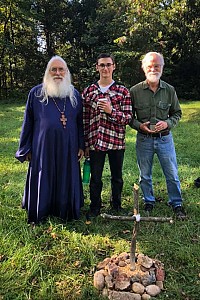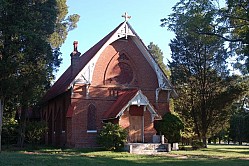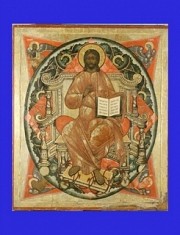By Matushka Deborah Johnson
(From Orthodox America)
When I was growing up, we lived about half a mile from the edge of a town planted in the rich prairieland of central Illinois. In the summer, I used to wake up early in the morning to go on long walks by myself, following a road that took me into the countryside. Standing in the midst of the prairie, I could look around me on all sides and see, far off in the distance, the place where the sky met the earth. The greenness of the corn, the black earth, the white clouds all combined in a riot of color under the brilliant blue dome of the sky. I would just stand there and breathe it all in. My spirit soared in this place, and a longing for God was planted in my soul. This is how it was for me as a child.
My parents were not religious, so I was not brought up in any religious faith. I used to ask my parents about God: Does He exist? Who is He? Should we go to church (I wanted to go)? Is there a heaven, a hell, etc. But my parents gave me no answers. I was on my own. I intuitively apprehended the truth of God's existence, especially when I was on my walks out on the prairie. His signature was everywhere. St. Paul says: For the invisible things of Him from the creation of the world are clearly seen, being understood by the things that are made, even his eternal power and Godhead (Rom. 1:20).
Tertullian says that all souls are by nature Christian, and St. Augustine says that God has made us for Himself, and that our hearts are restless until they find Him. My own experience bears witness to this. My adult years before conversion to the Orthodox faith were a long and painful time of seeking God and His truth. I even went through a period of atheism, but I always had the memory of those times in the prairie to remind me that there was something else, something more to reality than what is seen. Through the years I would return to this place, and the wind in the grass was like a gentle whisper from God, nurturing in my soul a greater and greater longing for Him. And that was the extent of my godly upbringing.
Christian Upbringing
So, when I was asked to talk about Christian education in the home, and its importance to Orthodox mission, I could not draw on personal experience. I didn't come to the holy Orthodox faith until eight and a half years ago--I was already 35 years old. Perhaps many converts are in a similar position, not having been raised in an Orthodox family, although some were raised in pious Protestant or Catholic families.
Royal Martyr Empress Alexandra said, "No work any man can do for Christ is more important than what he can and should do in his own home." Our son Christopher was seven years old when we were baptized. He is now almost sixteen. When I look at him as a teenager, and reflect on my own teenage years, I see many positive differences. But even if I saw nothing, as parents we have God's promise, given to us in Proverbs: Train up a child in the way he should go: and when he is old he will not depart from it (Proverbs 22:6).
How can we do this? Fr. Michael Pomazansky writes:
"Every Christian mother considers it one of her primary obligations to teach her child prayer as soon as his consciousness begins to awaken, prayer that is simple and easy for him to understand. His soul must be accustomed to the warm and fervent experience of prayer at home, by his cradle, for his neighbors, his family. The child's evening prayer calms and softens his soul, he experiences the sweetness of prayer with his ... heart, and catches the first scent of sacred feelings.
"[When a mother takes her child to church,] Christ is invisibly present there, and He sees the child, blesses him, and receives him into the atmosphere of the grace of the Holy Spirit. Grace envelopes him as a warm wind wafts over a blade of grass in a field, helping it to grow up slowly and gradually, to put down roots and develop .... Allowing children to have contact with spiritual grace is one of the first ... concerns of a Christian who thinks about his children, and the task of Christian society, which is concerned about its youth. Here is the door to a correct Orthodox Christian upbringing." (From "Children in Church")
Acquire the Spirit of Peace
St. Seraphim said, "Acquire the Spirit of Peace, and a thousand souls around you will be saved." We can help our children acquire this Spirit by teaching them how to pray, by centering our family lives around the Church calendar. Gather daily at the icon corner with your children to do your morning and evening prayers. Read out loud to them the Lives of the Saints. (A wonderful source of daily readings is The Prologue from Ochrid, by Bishop Nikolai Velirnirovich, and the first volume of St. Dimitri of Rostov's Menology has recently become available; the calendar can be ordered from St. John of Kronstadt Press in Tennessee.) Teach them about the upcoming feasts of the Church. If they're old enough, read the Sunday Gospel to them ahead of time and discuss it with them.
Most importantly, teach them in difficult times to hold on as tightly as possible to the Church, the same way that they hold on to their mother when they awaken from a nightmare. Teach them that our Faith is not just a collection of beliefs; it is a living Body, a living Faith. If we desire to teach our children to love our holy orthodox Faith, we cannot do it through words alone, but rather we must do it through our own lives. Then we will be raising up members of the Body of Christ who are truly capable of doing missionary work, according to St. Seraphim's definition.
The Formation of Churches
If we are to plant new churches in this country, we will need priests. Where will these priests come from? From our own Orthodox families. They will be our sons. It's not that we decide ahead of time, "My son will be a priest." But we should raise all of our children in an atmosphere of fear of God and piety. Saint Innocent of Moscow, speaking of the upbringing of young men destined for the clergy, says:
"Teach ... the children to fear God at all times and everywhere .... The fear of God is one of the gifts of the Holy Spirit .... One of the principal methods in acquiring the Holy Spirit is prayer .... Instruct the children in prayer, and they will have the fear of God .... The primary development of the spiritual side of our clergy is not dependent upon our schools.., but on the upbringing in the home." (From "The Upbringing of Spiritual Youth")
I would like to share with you some thoughts which are based on a conversation I had with Fr. Deacon Leonid Mickle, our godfather.
There is a Russian saying: if you get ten Russians together, they will form a church. The priest for the new community should come from the community itself. Don't say to the bishop: "Send us a priest." Do you want a church enough that someone within the mission is willing to take on the awesome responsibility of the priesthood? If you have a community that's really zealous about the Faith, enough to maintain regular Reader's services, it seems amazing that no one would be willing to come forth and go the extra step to make the community complete, so that they can regularly partake of the Body and Blood of Christ. If a community is living the Faith, then either an eligible candidate will come forward, or God will provide one.
Do you have twenty people who would do what the Washington, D.C. community of St. John the Baptist did---mortgage their own property to help pay for the church? They didn't say, "We want to have a church with gold domes---you provide this for us." People came after a full day at work to lay bricks for the new church building. You should see the church now. Even people who come from Russia say it is one of the most beautiful churches they have seen.
When Fr. Leonid's parish priest in New Jersey, Fr. Vasily, died unexpectedly in his 90's, there was a retired military man whose wife had died a couple years earlier. He was a house painter and general handyman. He agreed to be ordained a priest. With a lot of assistance he became a good spiritual father and served for many years. On weeknights he taught classes. The community was pious, sober, and prayerful, and this gave him the strength to step forward. He reposed in church, on Thomas Sunday, during the singing of the Troparion of the Resurrection. Here was a good priest, a simple man, who came from the community.
Examples from my Church
I would like to tell you about two people in my own church community who are striving to witness to the Spirit of Peace. We met these two people on our first visit to an Orthodox church; it was our first exposure to Orthodoxy as embodied in the lives of living human beings. They are now our godparents. Fr. George and I had come for a Vigil. It was Bright Saturday night almost nine years ago, the eve of Thomas Sunday. Fr. Leonid, whom I've already mentioned, and Tatiana Vsevolodna Prujan were in church, as usual; Fr. Leonid serving in his role as deacon, and Mrs. Prujan at the candle stand. We had come to the church after reading Russia's Catacomb Saints, which tells about the New Martyrs of Russia. We were seeking the Church of these New Martyrs. What kind of people would give their lives for the Faith? Where is this Faith? Is it possible that it actually exists here on earth?
We walked hesitantly through the doors of the church that first night, not knowing what we would find. It was like walking into another world. It was like coming home after eons and eons of being away. The holy light of Christ's Resurrection shone in the faces of the people on this Bright Saturday. After the three-hour Vigil, our godparents-to-be stayed and talked to us for another hour and a half, answering our many questions. How many of us would be willing to do the same, after three hours in church?
Mrs. Prujan was born in St. Petersburg in 1909 and lived through the Siege of Leningrad. She had just lost her husband two weeks before, on Palm Sunday. Was she bitter or depressed, or withdrawn? No. She never questioned the wisdom of God. She put her arm around me and warmly began to tell me all about Parcha, how it was too bad that we had missed it, how beautiful it was, how beautiful the church was. She even gave me a recipe for the traditional Russian dessert served on the feast and named after it--pascha. Fr. Leonid was also a cradle Orthodox. He went through a period of questioning the Faith, a period of great struggle, and then was led back with renewed zeal.
These two people literally reached over the edge of the Ark and pulled us on board. This is missionary work. It is done on a one-on-one basis, one person to another, one soul to another. If we want to do this kind of work, then we must be like them. The missionary process in the West conjures up images of a Protestant preacher, shouting, berating and Coercing people. Or Jesuits steam-rolling over people. The Orthodox missionary process is like the wind in the prairie grass; it echoes the "voice of a gentle breeze"--the Holy Spirit, the Spirit of Peace.
The process of conversion is a mystery which we must respect and not interfere with. It is a secret between the heart of a man and God. We sing about this during Matins, in the Hymn of Ascents: "In the Holy Spirit, every soul is quickened, and through cleansing is exalted and made radiant by the Triple Unity in a hidden sacred manner." We can't push it because we'll be responsible if that person converts and then falls away because they weren't ready. If we, through pride, try to interject ourselves, to talk when we shouldn't, we'll be making so much noise that we'll keep a potential convert from hearing that "voice of a gentle breeze." We'll have to answer to God for that.
A Tremendous Debt
The Orthodox Faith is transmitted not only through books, but also through its people, the Body of Christ. Have you ever looked at the pictures of the blew Martyrs of Russia? Have you looked closely at their faces? My church is full of people who are relatives of the New Martyrs. Vladimir Makarich Pavlenko is now 76 years old. When he was a boy of fourteen, his father, Priest-Martyr Macarius, was beaten up by the KGB and dragged away, never to be seen again. There are many stories like this one in my church.
If it weren't for these people, we would not be standing here now. We owe them a tremendous debt. In the remaining time which God has given to us on this earth, we will not be able to do enough to show our gratitude, to pay this debt. These are our fathers in the Faith. They have preserved the Faith so that we might inherit it, whole and untouched. Let us try to do the same for our children. We have not been called upon to witness to the Faith with our blood. Let us at least try to imitate these relatives of the New Martyrs, who have given so much.
We in the Russian Church Abroad have a special responsibility, because of our heritage--the New Martyrs of Russia. Picture a book with millions of pages, one for each of the New Martyrs--his life, his witness to the Faith. This is the Book of Life, and we hope to follow in their footsteps, as it says in the old spiritual, "I want to be in that number when the Saints go marching in." This is an awesome responsibility. Like the Jews who tried to say that they would be favored by God because they were the children of Abraham, we will not get into heaven because we are the children of the church of the New Martyrs, or because we are the home of Saint John Maximovitch. If anything, we will be held responsible for the grace which we received because of these things, and because we did not make use of it.
Missionary work consists not only of helping to bring people into the Church, but also of helping to keep people from falling away, or helping them to return if they have fallen away. In other words, it consists of helping as many people as possible to get on, stay on, or get back on, the Ark of Salvation, so that they are on it when it reaches the farther shore. It consists of loving our neighbors, and thereby helping people to love each other. We have all experienced being in the presence of someone who embodies such love and warmth. Such a person acts like a fire melting wax, softening our hearts, enkindling the Divine fire within our own hearts, that same fire that the Apostles felt on the road to Emmaus when they said, Did not our hearts burn within us?
Instead of finding fault with the way the Church carries out her mission, we must correct our understanding of her mission. Instead of saying, "The bishops aren't doing this or that," or "The Church isn't missionary enough," the question each of us has to ask is, What missionary work am I doing? Am I striving with all of my strength, with all of my heart, soul, mind, and spirit, to love God, and to love my neighbor as myself? Does that Holy Breath blow through my soul unhindered to that of my neighbor? Does my life radiate the Spirit of Peace, that Holy Spirit of which St. Seraphim spoke? If yes, then we can honestly say about ourselves: We are unprofitable servants: we have done that which was our duty to do (Luke 17:10). If not, then we can fall down on our faces, and, with team, beg the Lord to give us the Holy Spirit, for we have His promise: If ye then, being evil, know how to give good gifts unto your children: how much more shall your heavenly Father give the Holy Spirit to them that ask Him? (Luke 11:13).
DOUBLE YOUR CONTRIBUTION
THROUGH OUR MATCHING GRANT!
Now through Palm Sunday, April 28,
Matching every dollar, up to $38,000!
Help us build our new Parish Hall,
and move to our historic Chapel Campus!
(Want to contribute to our General Fund?
Please scroll down ~ Thank you!)
From 'St John of Shanghai and San Francisco, Zealous Builder of Churches'
Everywhere he went he either oversaw the building of churches or supported the same with his attention and prayers... He wrote about the godly work of building churches:
"In building churches here on earth, we create for ourselves eternal habitations in heaven."
ALL DONATIONS TO OUR
BUILDING FUND
Are DOUBLED, up to $38,000
Now through Palm Sunday, April 28




